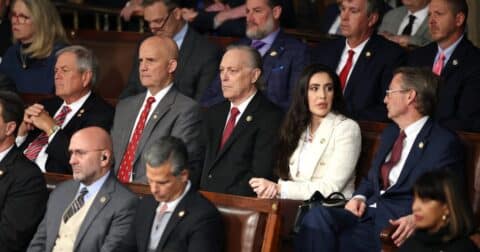News
Republicans’ New Farm Bill Takes Aim at Animal Welfare and Pesticide Regulations
Policy•8 min read
Explainer
A few informed predictions.


Words by Seth Millstein
Republicans won control of Congress and the White House in the last election, and their victories will have major ramifications for the future of climate and agriculture policy in the United States. It’s too soon to say with certainty what exactly these ramifications will be, but we can nevertheless make some educated guesses about what to expect from the new Congress on agriculture and climate.
There’s no doubt that Republican lawmakers will seek to scale down, roll back or repeal certain climate and agriculture-related policies that the Biden administration implemented, such as the Inflation Reduction Act’s support for climate-smart agricultural programs.
But this doesn’t mean everything will be on the chopping block, says Laurie Beyranevand, Director of the Center for Agriculture and Food Systems and law professor at Vermont Law and Graduate School.
“There’s been a lot of money that got pumped into ag research under the Biden administration, and I think generally, Republicans are really supportive of that,” Beyranevand tells Sentient. “The Trump administration is definitely going to want to try to figure out which of those things farmers in the ag community are supportive of, and I don’t think, wholesale, they’re unsupportive of what Biden was trying to accomplish.”
It’s also important to note that, while Republicans do have majorities in the House of Representatives and the Senate, their House majority is very small: just five seats. This means that any piece of legislation can’t afford to lose more than five Republican votes if Democrats remain unified, and this is a wrinkle that could potentially have significant consequences on agriculture policy.
Nevertheless, let’s take a look at what sorts of policies the new Republican Congress might pursue in the upcoming session.
Opposition to immigration is President-elect Trump’s flagship political issue — he’s pledged to carry out “mass deportations” of immigrants in his second term — and Congressional Republicans are already pursuing legislation that would help implement this agenda.
But as Beyranevand notes, America’s farming sector is highly dependent on immigrants, documented and undocumented alike, for its labor force. Deporting these folks, or sharply reducing the amount of immigrants in the country through other means, would create a shortage of agricultural workers, thus driving up the price of agricultural goods and reducing America’s production capacity.
Normally, this would result in Americans purchasing more imported agricultural goods. But Trump has also pledged to enact tariffs on agricultural imports, and as we saw during Trump’s first term, tariffs also cause prices to increase.
“If we have an ag labor shortage, and we’re not able to produce as much domestically, then we’re going to rely on imports, necessarily,” Beyranevand says. “But Trump has also said that he wants to increase tariffs and reduce imports.”
During Trump’s first term, he sharply increased crop subsidies to farmers in order to stem the economic damage caused by his tariffs on agriculture, and he may well do the same during his second term if the GOP’s anti-immigration policies end up hurting American agricultural producers.
The first order of business for the 119th Congress — and the likely vehicle through which Congress will pass new food and agriculture-related policies — will be the new Farm Bill. At least, it should be the first order of business, as Congress has failed repeatedly over the last two years to authorize a full Farm Bill, and has had to pass two short-term extensions of the last Farm Bill as a result.
The Farm Bill is an enormous legislative package containing a plethora of food and agriculture-related policies. It’s an incredibly important piece of legislation, as America’s farming sector is more or less reliant on it to function, and Congress must pass an updated version of it every five years or so.
The last five-year Farm Bill was passed in 2018, and Congress has been unable to agree on a new version ever since. Instead, lawmakers have passed extensions of the 2018 bill, the most recent of which expires in September. However, Republicans now control both chambers of Congress and the White House, which will make it easier to pass a new five-year bill, and barring something extraordinary, that’s what lawmakers will do in 2025.
It’s far too soon to say with certainty what will and won’t be in the next Farm Bill. However, we can glean some things from the Farm Bill proposal House Republicans released in May, as well the Farm Bill “framework” Senate Republicans released a month later.
In 2022, Congress passed the Inflation Reduction Act (IRA), which allocated $19.5 billion to USDA conservation programs that benefit the environment. The law says that a conservation program must “directly improve soil carbon, reduce nitrogen losses, or reduce, capture, avoid, or sequester carbon dioxide, methane, or nitrous oxide emissions, associated with agricultural production” in order to be eligible for the funds.
That’s the idea, anyway; in truth, it’s not clear that all of these “climate-friendly” programs are actually benefiting the environment. There are a number of reasons for this, including lack of transparency and questionable methodology on the part of the USDA, but at least in theory, this money is legally required to go to programs that benefit the environment.
Republicans want to remove this requirement, which is sometimes referred to as the “guardrails” for climate-smart policies. If this were to happen, the USDA would be free to spend what’s left of this money — around $13 billion, as of May — on any of its many conservation programs, not only those with a demonstrated benefit to the climate.
In addition to containing many farm- and agriculture-related policies, the Farm Bill is also how the government funds SNAP, the federal food stamps program.
SNAP funding once enjoyed bipartisan support in Washington, but the GOP changed their tune on food stamps after Barack Obama took office: Despite expanding the program twice during George W. Bush’s presidency, Congressional Republicans voted to cut food stamp funding in 2013, then again in 2018, and are now doing so once more in the most recent Farm Bill.
The amount of money food stamp recipients receive is determined by something called the Thrifty Food Plan. This is a diet plan, created by the USDA, that’s meant to provide maximum nutrition for a family of four on a frugal budget.
The House GOP’s Farm Bill proposal would limit the USDA’s authority to adjust the cost of the Thrifty Food Plan over time, which would effectively cut SNAP benefits by $30 billion over the next decade, according to an analysis by the Center for Budget and Policy Priorities.
Congressional Democrats oppose these cuts.
In 2018, California voters passed Proposition 12, which banned the production and sale of eggs, pork and veal produced using “extreme confinement” — that is, the severely cramped living spaces that are par for the course in factory farms. Various elements of the meat industry sued to block the law, but the Supreme Court upheld it in 2023, and it’s now in effect.
Because Proposition 12 forbids the in-state sale of these foods even if they were produced in other states, it’s had a ripple effect on the entire sector, as California is a major market for eggs, pork and veal. This has made it target number one for the meat industry — even though many individual farmers actually like Proposition 12.
House Republicans’ Farm Bill proposal would both repeal Proposition 12 and forbid any other states from enacting similar legislation. Senate Republicans’ Farm Bill framework suggests, without explicitly stating, that it would do the same.
But repealing Proposition 12 has proven to be surprisingly controversial among Republicans. A coalition of 16 House Republicans signed a letter urging their leadership not to repeal Proposition 12, as they feel that doing so would be a violation of states’ rights. Months later, eight more Republicans came out against repealing the law, on the grounds that doing so would make America less competitive with Chinese meat producers.
The fight over Proposition 12 has aroused very strong feelings on both sides of the debate, and it will no doubt be one of the gnarliest Farm Bill-related disputes.
It’s worth keeping in mind that many policies regarding food, agriculture and the climate are outside of Congress’s hands. Trump has pledged to withdraw the U.S. from the Paris Climate Accords, scrap a proposed rule aimed at increasing electric vehicle usage and roll back environmental regulations — and these are all things that he can do without Congressional approval.
But Congress, and the Republicans who control it, will still play an enormous role in shaping America’s climate and food policies over the next two years. Only time will tell exactly what those policies look like.
Correction: an earlier version of this story included a misspelling of Laurie Beyranevand‘s name.